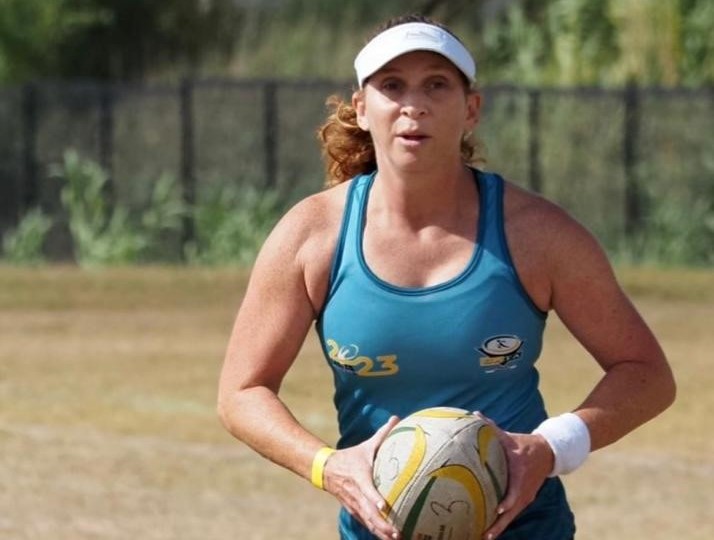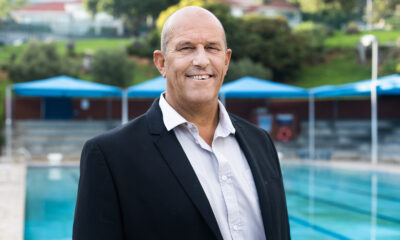
Sport

Forties and fearless: Herzlia alumnus realises Springbok dreams
Many athletes in their late 40s have waved goodbye to their chances of representing their country at a World Cup. However, 46-year-old Hayley Landau will be playing for the over-35 Springbok team at the Touch Rugby World Cup in Nottingham, England, starting on 15 July.
This Capetonian and her teammates have made a lot of sacrifices to play at the highest level of touch rugby, a pay-to-play sport in South Africa. “We’re all married with kids, which makes it an even tougher situation because we’ve got families to look after,” Landau says. “We’ve taken the time to get ourselves fit but then also manage family and work.”
Landau, a Herzlia alumnus and teacher by profession, is one of the six or so players in their mid-to-late 40s who will be representing the over-35 Springbok team. Some of their teammates are about 10 years younger than them.
Landau and her teammates, especially those from Cape Town, have been on the same team for a long time, so it’s a tight-knit group, she says. “With the friendship, the camaraderie, and knowing how we play, it’s comforting to know that we’re all going again.”
This will be Landau’s second World Cup, having played for the over-27 South Africa team at the 2019 edition in Malaysia.
Ahead of the 2019 World Cup squad announcement, “It was almost a shoo-in that I would make the side as there weren’t many players up for selection,” Landau says. She was a little bit more nervous this time as more players were eligible for the over-35 team and some are almost a decade younger than her. “When I was selected, it was a relief. Speaking to friends, they didn’t know why I was so worried. I realised that I’m very much part of this team and can add lots of value.”
Landau worked incredibly hard to make the team, and consulted a biokineticist for strength training and conditioning. “At our age, if the body isn’t conditioned, you’ll be more prone to injury,” she says. She didn’t want a repeat of the hamstring tear she suffered a while before the 2019 World Cup.
“Our coaches kind of left the fitness and conditioning up to us. It has been great that there is that faith and belief in us. I don’t want to be the weakest link, so I’ve put in hard work. I want to be there and make a difference to the team.”
After all her gym and fitness work, Landau can now push her body to do things she never thought were possible in her mid-40s. “It’s amazing to be able to play the sport at the highest level. At the end of March, we played a three-match series against the French, and we beat them in each game. Now we’re going to the biggest Touch Rugby World Cup ever.”
Thirteen nations took part in the first Touch World Cup in 1988, but this year’s showpiece boasts 39 nations taking part and about 1 000 matches in the week-long tournament. “It’s exciting,” Landau says. “Hopefully we’re good enough to compete for a medal. We’re going there with a positive mindset.”
South Africa has reached the final at three Touch Rugby World Cups, but lost on each occasion – the men’s over-35 side coming out second best in the 2007 final in Stellenbosch and 2011 final in Scotland, and the men’s over-30 side falling at the last hurdle in 2019.
Landau, who has been sporty her entire life, got into touch rugby while doing an internship at Western Province Rugby in 1997. She went on to play for the Western Province B and A sides.
She realised her dream of playing for the Springboks at the highest level at the 2019 World Cup. “Being 42, it took such a long time to get there, but, you know, never give up on your dreams. I scored four tries at the tournament, playing against other ladies who are the best in their country. Our team came fifth out of eight. This time we’re a little bit more hopeful.”
Landau says the top two teams, Australia and New Zealand, “have a very professional setup, so we’re quite lucky that New Zealand isn’t in our division. That gives us a better chance because Australia and New Zealand are really a cut above.”
Landau will play against Australia, where the sport started in the 1960s, as well as England, Fiji, France, Ireland, Singapore, and Wales.
Inasmuch as the Springboks have a team manager and a coach, “England have things like physios, analysts, and psychologists,” Landau says. “Not to say that we’re not a professional setup, we are, but we don’t have the funds for those things. But once you’re on the field, what counts is the experience, the game breakers, and creating magic out of nothing.”
Landau says touch rugby is a wonderful, fast-paced sport which is still gaining popularity. “There’s never a time where something isn’t happening. You’re always attacking or defending. It’s tactical and strategic. You throw in something that’s going to surprise the opposition. That’s how you score your tries. You’ve got to be fit and really switched on.”










